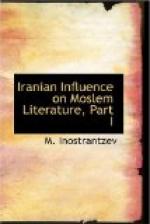There is mention of several authors and books similar to Kalileh wa Dimneh with the names of their authors including Sahal Ibn Harun, Ibn Rayhani, Al Katib. (p. 30.)
Says Ismai: In the alphabet of the Romans there is no zad and among the Persians there is no tha. (p. 36)
A longish definition and description of oratory by Ibn ul Mukaffa. (p. 64.)
Ibn Mukaffa again referred to. (p. 65.)
Instances of Arabic poetry in which Persian words and phrases are intermingled e.g., garden for unuk (neck); av sard for cold water, &c. (p. 79.)
[There are several other instances where the Persian words are there, but the copyist and possibly also the editor, do not seem to have understood the Kasida and the editor observes in a marginal note that, the text is corrupt, G.K.N.]
PART II.
Mention of Sahal Ibn Harun. (p. 37.)
Mention of Persia, (p. 53.)
Mention of Abdallah Ibn Mukaffa. (p. 84.)
Mention of Persia, (p. 92.)
Dicta of Ibn al Mukatia on the dignity of kings and of nobles, (p. 104.)
Reference to Khalid al Kisravi. (p. 105.)
Reference to Ibn al Mukaffa. (p. 109.)
Khalid al Kisrawi. (p. 112.)
Al Hurmuzan. (p. 139.)
On the service of kings. (p. 176.)
PART III.
The ways of the Shuubiya. (p. 2.)
Reference to Persia. (p. 5.)
Persia and Arabia compared. (p. 7.)
Arabia and Persia compared. (p. 12.)
Arabia and Persia contrasted. The prophets of Ajam. (p, 13.)
Reference to Persia. (p. 44.)
The Persian throne. (p. 77.)
Dicta of Mukaffa. (p. 87.)
Khalid al Barmaki. (p. 110.)
Dicta on Adab of Mukaffa. (p. 135.)
Reference to Barmaki. (p. 174.)
Reference to Barmaki. (p. 170.)
Sahal Ibn-Harun. (p. 185.)
Dictum of Buzurja Meher. (p. 217.)
Madaini quoted. (p. 233.)
Persia referred to. (p. 234.)
PART III., PAGE 5.
[Sidenote: Value of Zoroastrian literature.]
And we note that the persons most superior with, regard to preaching our sermons are the Persians. And among the Persians the most clever in this respect are the people of Fars, and they are the sweetest in words, and their pronunciation is the most correct. And the most difficult in this respect are the people of Merv. The most eloquent dialect of Persia is the Dari. As regards the Pahlavi idiom, of the people of the country of Ahwaz are the best. And as regards the chantings of the HERBEDS and the songs of the MOBEDS the superiority in this respect lies with the annotators of the Zemzema. And it is said that he who desires to acquire proficiency




